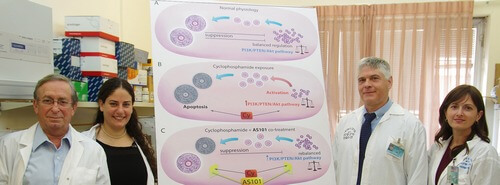In addition, a molecule (AS101) was found that stops the activation of the destruction mechanism and protects fertility. The results of the study led by Prof. Dror Meyrov from Tel Hashomer Hospital and Prof. Benjamin Shardani from Bar Ilan University were published in the Science Translational Medicine newspaper

In the research laboratories of the Fertility Preservation Center at the Sheba Medical Center, the mechanism responsible for the destruction of the eggs and infertility following chemotherapy treatments is being deciphered. Combined treatment with a molecule called AS101, developed at Bar Ilan University, while giving chemotherapy, has been shown to prevent damage to fertility.
Children, girls and women undergoing chemotherapy treatments due to cancer may suffer from long-term side effects related to the medical treatment. One of the severe side effects in this young population is irreversible damage to the egg reserve, cessation of menstruation at a young age, the main manifestation of which is the inability to conceive and bear children. For years, research and medical treatment focused on finding ways to preserve fertility in those women, such as in vitro fertilization treatments and egg or embryo freezing, or ovarian tissue freezing and transplantation after recovery, in order to renew fertility. These methods are not suitable for all patients and in addition they are invasive, expensive and success is not guaranteed.
The current research focused on understanding the mechanism responsible for the destruction of the eggs following chemotherapy treatments and on finding methods that can prevent this damage and thus allow normal ovarian function and maintaining fertility. The main part of the research work was carried out by the student Little Klich-philosoph as a doctoral thesis and Dr. Hadassah Runes, the director of the laboratory for fertility preservation at Sheba. "The study of chemotherapy damage in the ovaries of laboratory mice proved for the first time the mechanism responsible for the damage". Prof. Mairov, director of the Center for Fertility Preservation in Sheba, explains: "The pool of eggs that are in a state of dormancy constitutes the women's fertility reserve. The accepted assumption in the past was that chemotherapy directly destroys the egg pool and therefore the research in finding drugs that prevent destruction. The results of the current study prove, for the first time, that chemotherapy does not destroy the eggs that are in a state of dormancy, they cause accelerated growth. Thus their fate is decided and they die. The proof of the mechanism made it possible to examine the AS101 molecule, which was found to prevent the process of accelerated growth of the eggs, thus preserving fertility."
Prof. Shardani, director of the Institute for Cancer, AIDS and Immunology Research at Bar Ilan University: "The molecule AS101 was invented at Bar Ilan University, and has been in clinical tests on cancer patients for years. In their clinical trial, it was found that AS101 reduces the side effects of chemotherapy, moreover, it has been proven that AS101 does not harm the effectiveness of the anti-cancer treatment of the chemotherapy treatment, and can even increase the effectiveness of the treatment."
The proof of the mechanism of destruction and protection was carried out by the team of researchers in an experiment with laboratory animals. Removing the eggs from their natural environment, as was done in many works in the past, did not allow the discovery of the mechanism of the damage and would have prevented the finding of a protective agent. Proving the damage mechanism and the ability to protect fertility by blocking the "burning while growing" pathway as demonstrated in this work is important and groundbreaking. In the study it was shown that AS101 prevents the accelerated growth and loss of the eggs and thereby prevents the loss of the ovarian reserve. The ability of AS101 in combined treatment with chemotherapy has been proven to lead to a higher pregnancy rate and number of births compared to treatment with chemotherapy alone and thereby preserve fertility. Further studies must still be carried out before the preparation can be used to protect against chemotherapy damage in patients.
The entire study was carried out in Israel, by Israeli researchers and supported by the Cancer Society, the Ministry of Health, the Morris Kahn Foundation, Dave and Florence Moskowitz, CAIR, the James Lucinci Research Institute for Applied Sciences, SCI, IHEL, the Haim Ihal Foundation and the late Sara Draganster and competitive research funds from Israel and the world. The team of researchers who carried out the research in its various stages won prestigious awards in Israel and around the world.
Additional contributors to this research: Dr. Alon Carmeli, Dr. Michal Fishel-Bartel, Dr. Hagai Ligomski, Dr. Shoshana Pagalin, Prof. Ido Wolf, Dr. Hana Kanti.
